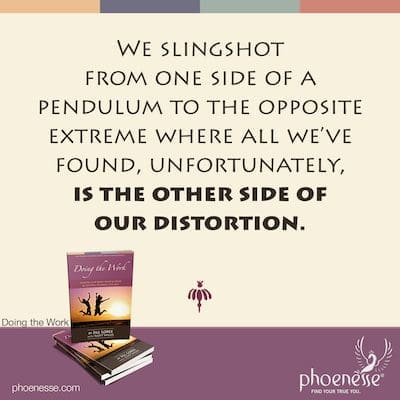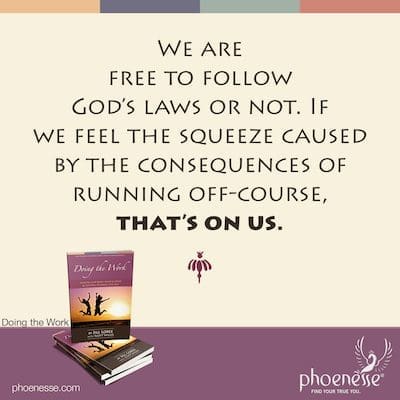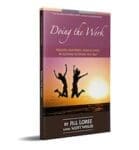It’s Time for a Break

If there’s one thing that’s hard about living in this dualistic world, it’s swinging from one wrong side of something to the other wrong side. So often, we slingshot from one side of a pendulum, where we are inadvertently living in distortion, over to the opposite extreme where all we’ve found, unfortunately, is the other side of our distortion.
But such is the motion that’s typically followed—and in many cases, even necessary—to eventually bring ourselves to center, where reality happens. That’s where we learn to let go of the edges and negotiate the middle way.
An example of this lies in our reaction to living according to what others think. On one pole, we can fly in the face of society and embrace our rebellious spirit: whatever they want, we want the opposite. We expect that our behavior will create a flap and most likely it does. Oddly, this makes us happy.
Flip this over and we turn into conformists, aligning ourselves with what’s expected and therefore expecting to be approved of. When the waters remain unruffled, we feel content. Pay no mind to what we want: if they’re happy, we’re happy.
In both cases, we’re beholden to “the other.” As such, we have lost our way. Neither strategy is free and no one adopting either method is truly content. Even if our attitudes and actions are actually in agreement with our own inner selves, when we’re coming from a place of either rebelling or conforming, we aren’t living from our true self, with true autonomy.
The Pathwork Guide points out something interesting regarding opinions: We are better served holding a wrong opinion that we have come to honestly through our own searching and exploring, than to hold an opinion that aligns more with truth but which we have borrowed from somewhere else. In short, we have to listen for the beat of our own drummer until we recognize its cadence as being our own. (See more about forming independent opinions in Finding Gold, Chapter 3: The Importance of Forming Independent Opinions.)

Eventually, our inability to navigate our way out of our illusions is going to bring us to a breaking point. Something’s got to give, which is the illusion of duality and the notion we can go on this way forever—veering away from one wrong solution and landing in another—and finally get it right. Staying lost in duality, without a lifeline to the greater truth, is after all a lose-lose proposition. And that brings us to the beauty of a crisis. Because a crisis will take us to our knees and make us turn in a different direction.
So far, we have mentioned several of God’s spiritual laws that are in place to help keep us running true. When we diverge from them—and we are perfectly welcome to do so—we will experience painful situations and crisis. We then have the opportunity to correct our course (or not) to get back to where we want to be.
For God’s laws have been carefully crafted to assure the further we deviate from them, the greater the pain we experience and thus the greater the incentive we have to course-correct. By design, this ensures we will eventually choose to make our way back to where we could have been all along had we remained in alignment with God’s will. For God’s will and our best-case scenario are the same thing.
This is an entirely impersonal process. There isn’t an old white guy in the sky angrily metering out punishment for our moral transgressions. We humans have been endowed with free will, meaning we are free to follow God’s laws or not. If we feel the squeeze caused by the consequences of running off-course, that’s on us. (See more about free will in Holy Moly.)
In Jill’s Experience
I learned how to sew at a young age and by high school, I was making most of my own clothes. I enjoyed the creativity but not the fact that things often didn’t fit well. Turns out, learning to sew and being a seamstress aren’t the same thing. Plus, the quality of fabrics I bought wasn’t great. I was using my meager earnings from my job as a carhop, so I was cheap. The cheaper I could make something, it seemed, the better.
Arguably, the preferred word to use here would be frugal, but I hadn’t evolved to that level yet. By the time I left college, I was in the habit of buying what was cheap, and it’s not a coincidence that I also had so little sense of myself.
Early in sobriety, I heard reference to having low self-esteem and I thought, “Are you kidding? I have no self-esteem.” Truly, I had no sense of who I was. The road of recovery, together with my unfolding spiritual path following the Guide’s teachings, have helped me fill in the blanks of knowing what I like and that I’m worthy of having nice things.
As one can imagine, it’s easy to ride such a budding awareness over to the other side of the pendulum where one lavishes themselves with gifts, to show, you know, just how much we value ourselves. Which of course is not an iota better than being cheap.
As these things go, my journey to finding my own value—while also learning to assess the value of the material things I buy—has not been a straight line. I have spent too much on some things and cut too deeply on other things. As they say, life’s a process, not a product.
One area that I have learned to be cautious is around the word “Sale!” I came to realize how I would accept far less than what I wanted if the price was right. As a result, I was left with clothes, furniture or other home goods that I didn’t particularly like, long after I forgot how much I had paid for them.
Which doesn’t mean I need to pay top-dollar across the board for everything to be happy. I am frugal by nature, and I often find items I value at a discounted price. But I also sometimes pay full retail for something that really appeals to me.
Self-responsibility is a piece of this puzzle. I have had plenty of periods in this life with tight finances, and I have also felt fairly comfortable at times. I have kept a careful budget for over fifteen years now and know where every dollar goes. And I pay all of my bills. At the same time, I don’t let that rule my ability to appreciate the grace notes in life that come from spending my money doing something I enjoy.
Money is a challenge for many, many people on this dualistic plane. It’s a perpetual crisis for some and a bounty for others. No matter where we land on the spectrum, it’s worthy of our consideration. What we should also consider is how we link it to our inner sense of self-worth.
In my most well-adjusted periods, I am responsible on one hand, while letting it flow as need-be on the other. This is an ongoing dance, and not one I’m perfect at. But I discovered something important along the way: the more I trust that I will have enough, the more true this turns out to be. The more I am willing to tend to my financial garden, the more fruit it bears. The more loosely I hold the reigns, the better I enjoy the ride.
In Scott’s Experience
The thing about crisis is that it has almost always built up over a long period of time. Things that you don’t address, or maybe aren’t even consciously aware of, build up until—wham!—your world shifts. An earthquake may cause great distress in an instant, but the strain that gets released all at once has actually built up over a long period of time.
I had that kind of earthquake crisis in a relationship with a family member I’ll call Chris. Here was the pattern:
I would behave in a way that felt right to me. Chris would do likewise, following Chris’s own values. Chris thought my behavior was inappropriate and tried to get me to change. I did not like this. So I deflected and basically ignored Chris.
Chris did not like my response. Chris felt I should comply, and pushed harder; I did not like this from Chris. I felt violated. So I continued to behave according to how I saw the world, plus I would deflect Chris’s aggression and pull away a tiny bit more than before.
This went on and on, around and around.
We never talked about what was really going on. We were not on the same page about anything. There was a thin veneer of civility over it all, so on the surface it looked like things were OK, but underneath this drama churned.
Eventually the amplitude of responses started rising and it abruptly broke fully through the veneer to the light of day.
Ultimatums were issued to me. I stood my ground. The ground started to shake. Then a great tear in the fabric of my life happened. It was shocking to me that a few back-and-forths could cause such a crisis in our relationship. I didn’t see it coming. But in hindsight it had been building up for decades.
I prayed hard to understand what happened. I eventually saw a vision of two vortices interacting. One vortex would spin and bump the other, spinning the second ever so slightly harder. Then the second vortex would come back around and bump the first, spinning the first slightly harder.
The one thing I had utter clarity on is that we were both equally responsible.
I tried to share this with Chris, but according to Chris, I was entirely responsible for the earthquake. I was therefore responsible for making things right. But to do that, we needed to heal the pattern. We never got past this point; it has never healed.
The way out for me was in wanting to see the truth more than wanting to be right. Honestly, once I saw the pattern, it made things a little easier, but it didn’t shift things all that much. In the rare times of a new interaction, I would still get my buttons pushed by Chris, and I would react from an unconscious wounded place in me.
It has taken years and years of “doing the work” for me to get down to the level of seeing and releasing these knots in my psyche. And I’m not done yet. The experience has been acutely painful for me, but also a great teacher. Now, whenever I experience difficult interactions, I immediately start praying to see the patterns behind them. They are always there, and I know I have a part to play and something to heal.
Next Chapter
Return to Doing the Work Contents


